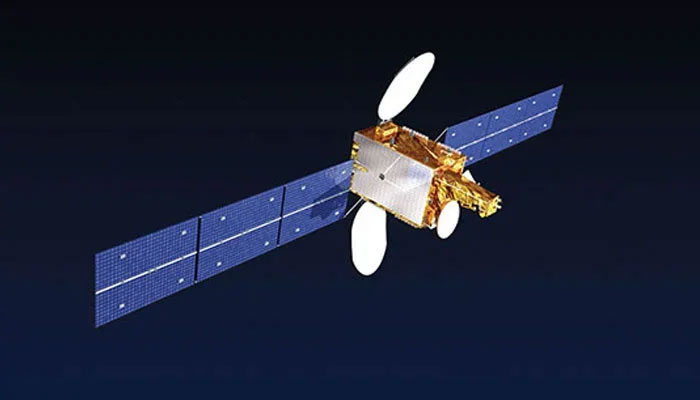Three LEO satellite operators await Islamabad nod
Pakistan’s satellite communications market is attracting significant interest from global Low Earth orbit satellite operators
ISLAMABAD: Three global Low Earth Orbit (LEO) Operators including Starlink, OneWeb and Shanghai Spacecom Satellite Technology have shown their interest for kick-starting operations in Pakistan but Islamabad has not yet granted any permission.
Pakistan’s satellite communications market is attracting significant interest from global Low Earth orbit (LEO) satellite operators, including Starlink, OneWeb, and Shanghai Spacecom Satellite Technology.
However, none of these companies have received the mandatory No Objection Certificate (NOC) from the Pakistan Space Activities Regulatory Board (PSARB), a prerequisite step before they can legally operate in the country.
The country’s security apparatus has scrutinised the capability of Low Earth Orbit Satellite Operators and they have fully complied with the government’s security concerns. Even if the Starlink was allowed to operate by granting NOC, the SIFC was taken into loop, said the sources.
In the regulatory framework, the government has established a satellite authority called Pakistan Space Activities Regulatory Board (PSARB).
The PSARB has been constituted by the government of Pakistan under the Pakistan Space Activities Rules-2024 and shall authorise and regulate all matters related to Outer Space and Upper Atmosphere in Pakistan.
The Starlink known as SpaceX high-up has approached the government of Pakistan and communicated in writing that they had been making efforts from the last four years for introducing Starlink in Pakistan.
They have gone to length to follow the official approval process and have painstakingly ensured to comply with each and every step with the objective to explain how their system works and how they could comply with the laws of Pakistan and how Starlink will benefit the people, enterprises, and government of Pakistan.
The sources said that it was communicated to the government at all forums that they worked closely with the Pakistan Space and Upper Atmosphere Research Commission (SUPARCO) and other relevant security agencies to ensure that all requirements are fully met.
Pakistan Telecommunications Authority (PTA) will have to issue a licence but they require a No Objection Certificate (NOC) from the Pakistan Satellite Registration Board (PSARB). However, despite repeated attempts it was conveyed to Pakistani authorities that they are required to issue NOC for securing licence to operate in the country.
Starlink has also signed a retailer agreement with Paksat to operate in the country.
In addition to the commercial retail opportunities provided through partnership with Paksat, as soon as it receives licence, Starlink intends to invest millions of US dollars in Pakistan to build out local network. Starlink will purchase colocation space in a data center, construction materials, fiber optic connectivity, power, and more. The total investment in Pakistan from Starlink will be substantial with many millions of dollars’ worth of recurring charges on top of the initial investments. The investment from Starlink will support local Pakistani companies, including Paksat, and will grow with time as demand increases. Starlink Pakistan has been registered with the SECP and will provide connectivity to the Pakistanis who need it most. Starlink service is evenly distributed across the entire country. This means that big cities like Karachi, Lahore, or Islamabad receive the same amount of bandwidth as the most rural areas.
This ensures that Starlink can provide high quality connectivity to those with no other options today; helping close the digital divide and supporting opportunities for education and economic development in rural areas, the sources said.
-
 Prince William, Kate Middleton ‘carrying Weight’ Of Reputation In Epstein Scandal
Prince William, Kate Middleton ‘carrying Weight’ Of Reputation In Epstein Scandal -
 Timothée Chalamet Compares 'Dune: Part Three' With Iconic Films 'Interstellar', 'The Dark Knight' & 'Apocalypse Now'
Timothée Chalamet Compares 'Dune: Part Three' With Iconic Films 'Interstellar', 'The Dark Knight' & 'Apocalypse Now' -
 Little Mix Star Leigh-Anne Pinnock Talks About Protecting Her Children From Social Media
Little Mix Star Leigh-Anne Pinnock Talks About Protecting Her Children From Social Media -
 Ghislaine Maxwell Is ‘fall Guy’ For Jeffrey Epstein, Claims Brother
Ghislaine Maxwell Is ‘fall Guy’ For Jeffrey Epstein, Claims Brother -
 Timothee Chalamet Rejects Fame Linked To Kardashian Reality TV World While Dating Kylie Jenner
Timothee Chalamet Rejects Fame Linked To Kardashian Reality TV World While Dating Kylie Jenner -
 Sarah Chalke Recalls Backlash To 'Roseanne' Casting
Sarah Chalke Recalls Backlash To 'Roseanne' Casting -
 Pamela Anderson, David Hasselhoff's Return To Reimagined Version Of 'Baywatch' Confirmed By Star
Pamela Anderson, David Hasselhoff's Return To Reimagined Version Of 'Baywatch' Confirmed By Star -
 Willie Colón, Salsa Legend, Dies At 75
Willie Colón, Salsa Legend, Dies At 75 -
 Prince Edward Praised After Andrew's Arrest: 'Scandal-free Brother'
Prince Edward Praised After Andrew's Arrest: 'Scandal-free Brother' -
 Shawn Levy Recalls Learning Key Comedy Tactic In 'The Pink Panther'
Shawn Levy Recalls Learning Key Comedy Tactic In 'The Pink Panther' -
 King Charles Fears More Trouble As Monarchy Faces Growing Pressure
King Charles Fears More Trouble As Monarchy Faces Growing Pressure -
 Inside Channing Tatum's Red Carpet Return After Shoulder Surgery
Inside Channing Tatum's Red Carpet Return After Shoulder Surgery -
 Ryan Coogler Brands 'When Harry Met Sally' His Most Favourite Rom Com While Discussing Love For Verstality
Ryan Coogler Brands 'When Harry Met Sally' His Most Favourite Rom Com While Discussing Love For Verstality -
 Sarah Pidgeon Explains Key To Portraying Carolyn Bessette Kennedy
Sarah Pidgeon Explains Key To Portraying Carolyn Bessette Kennedy -
 Justin Bieber Rocked The World With Bold Move 15 Years Ago
Justin Bieber Rocked The World With Bold Move 15 Years Ago -
 Sam Levinson Wins Hearts With Huge Donation To Eric Dane GoFundMe
Sam Levinson Wins Hearts With Huge Donation To Eric Dane GoFundMe




